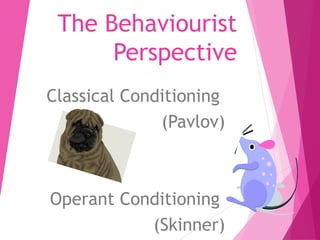
1.2 -behavourist_operant_sc
- 1. The Behaviourist Perspective Classical Conditioning (Pavlov) Operant Conditioning (Skinner)
- 2. Todays Lesson: The Behaviourist Perspective By the end of this lesson you will be able to… Tell me what Operant Conditioning is… Apply at least ONE example Evaluate the Behaviourist Perspective for Operant Conditioning
- 3. B.F Skinner studied how animals can learn from the consequences of their actions…. He specifically focussed on Reinforcement Reinforcement strengthens the likelihood of behaviour re-occurring. We know Skinner did this on a rat but we can apply it to humans….
- 4. How does reinforcement effect out behaviour?
- 6. Positive Reinforcement This is something desirable is obtained to make behaviour happen again… to behave the same way again in order to receive the reward. Example?
- 7. Negative Reinforcement This is something undesirable is removed when the desirable behaviour happens. It is the removal of something unpleasant… Example?
- 8. Punishment This is when something undesirable is received after a behaviour to make it stop. Punishment is used in an attempt to decrease a behaviour Example?
- 9. Positive & Negative Reinforcement
- 10. Operant Conditioning Positive Reinforcement, Negative reinforcement, or punishment? A child gets £5 for washing the car. Positive Reinforcement
- 11. Operant Conditioning Positive Reinforcement, Negative reinforcement, or punishment? A parent shouts at a child for crossing the street without looking. Punishment
- 12. Operant Conditioning Positive Reinforcement, Negative reinforcement, or punishment? A salesman stops hassling his customer when he agrees to buy upgrades to a product. Negative reinforcement
- 13. Operant Conditioning Positive Reinforcement, Negative reinforcement, or punishment? Your teacher phones home when you don’t complete two pieces of homework. Punishment
- 14. Operant Conditioning Positive Reinforcement, Negative reinforcement, or punishment? Your teacher asks your parents to nag you until you complete your homework. Negative reinforcement
- 15. Operant Conditioning Positive Reinforcement, Negative reinforcement, or punishment? You receive a prize for finishing 2nd in a race. Positive Reinforcement
- 16. Operant Conditioning This was investigated by a psychologist called B.F Skinner. He trained rats to press a lever using both types of reinforcement.
- 18. Operant Conditioning He used positive reinforcement to train the rat, by giving the rat a pellet of food each time it pressed the lever. This caused the rat to learn that the lever = food, so it continued to press the lever.
- 19. Operant Conditioning He used negative reinforcement to train the rat, by running an electric current through the floor of the cage. When the rat pressed the lever, the electric shock would stop. This taught the rat that lever = getting rid of something bad.
- 21. Operant Conditioning This study shows that behaviour is learnt through operant conditioning i.e.: that reinforcement (positively or negatively) makes behaviour become repeated.
- 22. Explain how stopping you going out for a week for missing your 10:30 curfew is a punishment & NOT negative reinforcement?
- 23. Using positive reinforcement explain why people may continue to starve themselves when they have an eating disorder…?
- 24. Operant Conditioning in Health & Social Care…. How could we use NEGATIVE REINFORCEMENT in health & social care settings?
- 25. Applying the Behaviourist Perspective… Q. Give an everyday example of how staff in an early years nursery could use positive reinforcement with a child who behaves well or shares their toys.
- 26. Applying the Behaviourist Perspective… Q. Why would child psychologist’s say that negative reinforcement is better than punishment?
- 27. The Behaviourist Perspective One strength of this assumption is that it has been developed to treat atypical behaviour. For example in treatment of schizophrenia, patients are given positive reinforcement for appropriate/good behaviour. - This is called token economy. M1
- 28. The Behaviourist Perspective But this means that behaviour could be UNLEARNT through token economy…. M1
- 29. The Behaviourist Perspective Another strength of this approach is that it highlights the importance of the environment on our behaviour M1
- 30. The Behaviourist Perspective One limitation however is that other researchers show learning can occur without reinforcement. For example Social Learning Theory shows that people can learn behaviours just by watching and copying role models. M1
- 31. The Behaviourist Perspective This assumption is also criticised for being too deterministic. This means that it believes humans have no free will, and their behaviour is controlled by the environment. What about nature? M1
- 32. The Behaviourist Perspective Skinner used rats….. So? M1
- 33. The Behaviourist Perspective Not all behaviour is learnt or unlearnt. Some people may be aggressive because they have high levels of testosterone (nature). Positive reinforcement would not be effective in changing this behaviour. M1
- 34. Behaviourist Perspective Case Study: Derek - Operant Conditioning Derek is 45 years old and attends a Day Centre for adults with learning difficulties. The staff at the centre find his behaviour challenging and unacceptable. Derek often shouts out and demands attention and he refuses to comply with the simplest of instructions that all clients are expected to follow. Describe how the staff at the Day Centre use operant conditioning to modify and change Derek’s behaviour.
